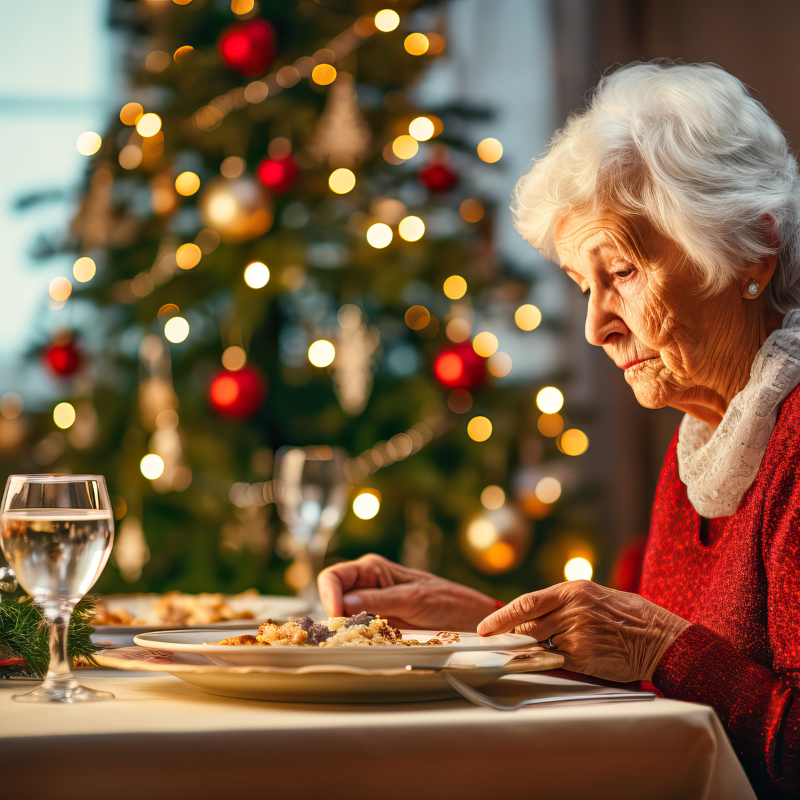
Grief Takes a Holiday
November 22, 2023
There’s a crucial difference in timing between the actual arrival of the “holidays” and when we first begin seeing full-on evidence in retail stores of their impending arrival. Once Halloween arrives, and even sooner, the rush is on.
The holidays are considered the most joyous, festive time of year, emphasizing family traditions, togetherness, and celebration. It is the season of giving. Yet, when a family has lost a loved one, the juxtaposition of giving and having something so dear taken away creates a cognitive dissonance that makes it challenging for the survivors to engage in the holiday spirit. A cheerful frame of mind is overwhelmed and collapses under the disruptive weight of grief. Indeed, one might rightly proclaim that “grief takes a holiday” as its prisoner.
In our September 17, 2023 blog, we discussed some factors that can amplify grief during the holidays and a few strategies that may stem the tide of suffering. This blog provides additional information regarding how grief can exert its influence to further deprive survivors of the support they need during a particularly vulnerable time. Included are:
- Emotional Upheaval. Grieving is a complex process that involves navigating through a spectrum of emotions, from profound sadness to anger. These emotions can profoundly intensify during the holiday and family gatherings. As a result, survivors frequently find themselves grappling with the weight of their feelings, robbed of the simple pleasure of spending time with those they love.
- The Empty Chair. The holiday setting, meant to be a time of familial connection, can become a stark reminder of the void left by the departed loved one. Survivors must confront an empty chair where their loved one sat at the dinner table, or the obvious absence of the loved one in family photos can become a poignant reminder of the irreplaceable loss.
- Nostalgia and Loss. Activities that were once a source of joy and connection may become painful reminders of the past. Whether hanging ornaments on the Christmas tree or preparing a special dish for Thanksgiving, these traditions now carry a heavy burden. Survivors may find it difficult to engage in these activities, robbing them of the sense of continuity and connection that traditions typically provide during the holiday season.
- Resurgence of Memories. Grieving survivors may find themselves haunted by the bittersweet memories of holidays spent with their departed loved ones. These memories, though cherished, become a double-edged sword, cutting through the joy of the present moment with a reminder of what has been lost.
- Social Withdrawal. Bereaved survivors, grappling with the internal complexities of grief may feel vulnerable and compelled to retreat from social interactions. Family gatherings and the support of friends may become awkward and elusive, further isolating the grieving family member during a time when connection is crucial.
- Triggers of Sorrow. Survivors often succumb to overwhelming feelings of sadness that permeate the holiday season. Festive decorations, sounds of carols, and twinkling lights may offer solace to others, but for grieving survivors, these elements may elicit despair.
- Search for Meaning. The holidays become a formidable challenge for those in grief. Prevailing themes of gratitude, togetherness, and celebration may seem elusive or inconsistent with the survivor’s internal landscape as they grapple with the meaning of life that often surfaces as a byproduct of grief.
- Altered Perspective. Bereaved survivors may begin viewing holiday traditions through a different lens, questioning the significance of certain rituals or the value of material expressions of joy. What once brought fulfillment may now seem trivial or inconsequential in the face of a profound loss.
- Strained Relationships. Grief can strain relationships within the family. While each member copes with their grief, familial interactions may become strained. Differences in coping mechanisms, communication breakdowns, or unmet expectations during the holiday season can create tension, further eroding the joy that family gatherings are meant to foster.
- Lack of Motivation. Decorating the home, preparing special meals, and participating in holiday events may become challenging for family survivors. The energy and enthusiasm that once accompanied these preparations are replaced by a sense of apathy, diminishing the celebratory atmosphere for both the individual and the family.
In summary, grief’s unsettling influence during the holidays is a complex challenge that impacts survivors at various intersecting levels, including the emotional, social, and traditional aspects of the festive season. The factors described above can cast a long shadow over the joyous atmosphere and contribute to the complexity of navigating the holiday season in the aftermath of loss. Understanding and compassion are essential in supporting those grieving during the holidays, acknowledging that the joy stolen by grief can be a slow process of recovery and remembrance.
If you are grieving during this festive time of year, remember that grief can not only take a holiday; it can completely take over. Keep in mind that it’s normal to feel abnormal. Most importantly, be kind to yourself! Contact Arlington Memorial Gardens to discuss grief resources and support.




